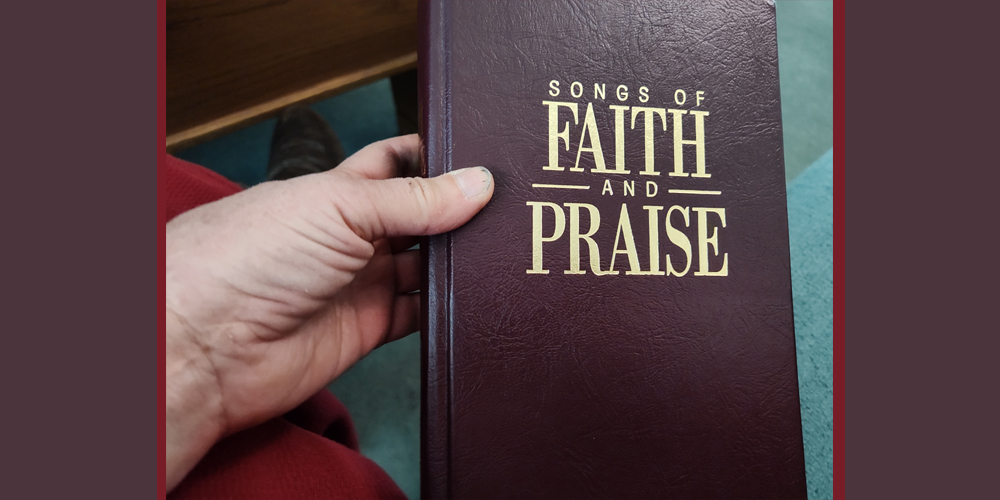Anyone who has been a visitor at a church knows that there are a variety of ways the family of God approaches and welcomes visitors and newcomers. Over the years when in this position, there have been things that make me feel either like I want to go back, or I want to never go back there again.
Today, I simply share some musings and observations about myself and others after returning for a third time to church on a Sunday morning. Though it might not seem like an accomplishment, for me, being in my situation and also generally untethered into daily “night owling,” getting myself up and together enough to drive 30 minutes to a morning church service is a minor battle/feat.
I have been greeted by one or two people for the past two weeks. The first time there, the woman sitting next to me immediately introduced herself, and we had a general conversation regarding where I lived, how I got there, and she shared that they moved fairly recently from another state to that area.
Because at the end of that service, the entire congregation got up and encircled the far walls around the pews, joining hands, and singing to welcome into that church family a newly baptized believer, and because I happened to know the version of the song/tune that is unique to that acapella community, the woman who conversed with me right afterward, whose hand I was joined with, likely made some assumptions about me and my church connections. This made for a general and easy-flowing conversation which mainly surrounded the larger size of this congregation and the beautiful singing.
On the second visit, last week, as I was leaving the sanctuary, a man greeted and introduced himself, taking note that I was a newcomer and had seen me the week before. As a newcomer, I made somewhat of an assumption (through his manner, tone and intentionality) that he was likely in leadership of some sort; perhaps he was an elder or deacon or otherwise more involved in the life of the church.
Today, another man who gave me the same impression–whether accurate or not–came and greeted me and introduced himself. We had a discussion about where I lived and that he and his wife don’t live too far from there. When I mentioned having been from Delaware and associated with another similar church, he referenced a woman in that congregation who was from Delaware.
Before long, he had sent his wife and several women (including that one) to chat with me.
And here is where I will describe what that was like for me, personally, for whatever it is worth as we consider how to connect with a newcomer and how to be a newcomer in whatever expression/tradition of a local community of believers.
I noticed that my anxiety increased when there was more than one person greeting me, when a small group of 3-5 women (some came and went) were all introducing themselves and of course, inviting me to an upcoming monthly women’s bible study/group event.
I attribute part of this to possibly my only child upbringing, or simply to my personality and communication style. I have just come to notice that I feel more at ease socially/conversationally with one-on-one interaction. I had already been invited today by the man who greeted to join a group of them who regularly go out for lunch after Sunday services, and then, I was being invited to a group of women gathering this Friday.
Now there is nothing anyone did wrong to invite me to such social interactions! What I’m about to describe simply has to do with my own social anxieties and peculiarities, as well as my current life situation and how that doubly affects these social issues. Surely I’m not alone in my nature, so maybe these musings will help someone else who is reading here.
I think I can clearly articulate what makes group conversation more challenging for me: it is the increased need to manage more variables.
Think of it like juggling.
__________
According to the Meyers-Briggs scale, I am an IFNP-t. That means I’m more introverted than extroverted; that I use more intuition than sensing (I’m never quite sure the difference in this, nor if I may be changing in this realm); that I am more of a feeling than thinking person (again…I do both an incredibly lot…it seems hair-splitting…but surely means that emotion often rules over cut-and-dry logic?); and that I am more likely to perceive (or be “prospecting”–exploring vantage points) rather than (quickly) judging a situation. Basically, I am generally open-minded (but, when I’ve been open-minded to something and then change course, I seem to come down as a “J” with a passion).
The questionnaire itself is made up of four different scales.
- Extraversion (E) – Introversion (I)
- Sensing (S) – Intuition (N)
- Thinking (T) – Feeling (F)
- Judging (J) – Perceiving (P)

__________
So there I was this morning, finding myself amidst 3-5 women all focusing their attention on me. When I am one-on-one with someone, I am only having to manage my part in a singular conversation. For example, and though I struggle with this, I can try to read their facial expressions, listen to their voice tones, and otherwise attempt to read the social cues involved in having a conversation.
When I was very young, I don’t think I did too well in this area. I was very shy and self-conscious. Again, many likely reasons, with some being as simple as being an only child. Only children tend to be more intense, and don’t experience socialization skills the same way as those with siblings. In fact, I’ve read that if you are the oldest sibling(s) and there was a 4-5 year gap between the next child, that essentially, your baseline in this aspect remains more akin to being an only child.
There is a 4 and a half year gap between my two sons, and I can see this aspect in their personality differences.
Anyway, when there are people coming and going in a conversation, and I’m trying to know what to share and not share about myself in a situation like that where I want to connect further and personally, but am unsure how or to what degree and in what further context (a group event, or one-on-one with a member somehow) it seemed the interaction(s) quickly unleashed what I would describe as somewhat of a gushing artery.
And of course, I am left with my typical replay in my mind of what I said, what each of them said, etc. Yes, I’m an overthinker at times.
The good thing is that I felt comfortable enough with the manner and expressions of the women present to share a bit more about my situation(s). I think what prompted this, was my discomfort in the invitation to the ladies group meeting. Not because it was bad to be invited (I realize, I have to start somewhere and maybe I should push past my discomfort and show up if possible) but because it triggered within me pre-suppositions about what it might feel like to show up.
As the conversation started, I was already imagining why I couldn’t come (and, this involves valid reasons on my end, to some degree) and why I would experience it (again, I was imagining in my mind) as an uncomfortable, even unhelpful to me, social situation.
One thing led to another, and I suppose I was trying to “explain” what my life situation is like currently on several levels, and of course, that led to my sharing of the most deeply distressing part of it (those who know me can imagine what this specific, complicated, heart-breaking thing is). I found myself apologizing for sharing some things and if I quickly seemed a little “worked up” over the situation (because, I am…it weighs on me continually), and I felt a genuine “it’s okay…that is what we are here for” from several, along with intentions for them to pray for me.
In fact, as I tried to manage (juggle) the responses of each woman in conversation (measure eye contact, and expressions, etc) there was one woman that I sensed more potential of a possible one-on-one connection with. She was the last to walk out with me, and I did get her name/number and gave her my info.
There is so much I could say about the need to be regularly and healthily connected to the family of God. As a newcomer, I project how I think others might think/view me. Each congregation/church tradition has some variation of this, and an amount of it boils down to human sociology. We are, to a degree, “pack animals” or “tribal” in that I believe when there is a human group of any sort, on some level we assess a number of factors both as a newcomer and as those who notice someone new in their midst–factors ultimately having to do with acceptance and emotional/personal/spiritual safety.
For me, I found myself picking and choosing what to share (and how to say it) also in terms of inwardly mentally juggling what I would know/perceive these ladies might want to know of me spiritually, since, the basis for joining into the life of a congregation is ultimately based on spiritual relationship with Jesus.
_________
Now I come to what I think has been the deepest hindrance to me settling into a faith community in Pennsylvania since 2020. And perhaps if you are on the end of welcoming in newcomers to your church community and haven’t personally experienced these things, it might help me to describe what I feel.
Many churches do recognize that the single person doesn’t always fit into things easily. And I believe this is different depending on the age of the single person and the reason of the singleness. Many churches (or several together) may host special activities for singles. And of course, youth group and college groups are inherently structured for the single person.
But being divorced in a church or coming into a new church as a divorced person, at least in my experience, carries a number of things I find challenging. And I speak from having gone through it twice.
First of all, I think that anyone who goes through a divorce amidst a bible-believing church community inherently encounters many difficulties. Our church community–if we have permitted ourselves to be closely knit together with these siblings in Christ–are like family. And we know how messy family can be. It is very difficult in a church community for people to not take sides between a divorcing couple, to some degree. While people try often to maintain equal positive relationship with each person and recognize the inherent number of problematic spiritual and pragmatic issues involved, it is a riddled with difficulty.
I do believe that God does hate divorce. And for good reason. It is a tearing asunder of the couple, the family, the children, and their place within the body of Christ (as a unit) and within the community, generally. But of course, there are many things that God hates, and sadly, divorce and the breakdown of marriages and families has become all too commonplace.
During my first divorce, an almost immediate issue was which one of us would continue attending “our church.” Yes…in divorce many things are divided up…and generally one of the divorcing partners ends up “getting” their church. Because, quite honestly, for most who divorce it is simply too uncomfortable to continue attending and participating in one’s smaller Christian community in the presence of one’s divorced (or soon-to-be) spouse.
In 2005, we decided that because our sons were involved in youth group and to keep continuity for them, and since our agreement was that they would live with me Monday to Friday and would visit him the entire weekend from Friday evening until Sunday afternoon, that he would be the one to take them to church there, and I would vacate that congregation, essentially.
Within four years, however, various things continue to change and unfold, and we agreed that my younger son would attend church with me. By then, my oldest was over 18 and did his own thing, but I became adamant that my younger son, as long as he lived with me and was a minor, would be required to attend church with me.
By that time, I had re-attached myself to another Christian community (but not without a period of wandering and tears on Sunday mornings visiting around…I’d be the first one out the door at one of the churches I first went to after the divorce…I just didn’t want to connect personally…I was in pain, and church was always a place for “my family”).
I told my youngest son that he did not have to take communion, but that it was my obligation in God to provide spiritual input and therefore, he must attend with me. He did not seem to mind attending (though there may have been a few troubling teenage-like conversations surrounding the issue at that time) and I noticed he chose to take communion, and also, to get involved with the young people there in various ways.
My second divorce in 2019 was quite messy–far beyond anything I could have ever imagined. And of course, because I had gone to Alabama for eight years, brought me back north in early 2020 at the beginning of a worldwide pandemic.
And here I am, three years later. I am grateful to God for His ongoing work, and I am both hesitant and curious at how my church attachment(s) will continue to unfold. While I have held on to several closer Christian friend connections in private, and of course am holding tightly to Jesus, this is now my fourth attempt at connecting to any specific local Christian community.
Each of the other three explorations lasted somewhere between 8-12 weeks, and I wonder if that is some type of turning point for people that are newcomers. Does it generally take that long at one place to discern whether it is a good fit? I don’t know.
But getting back to the social aspect of it for me as both a socially-wired “only child” introvert (I can be extroverted–especially in art situations–but it drains me!) and as a now twice-divorced woman.
It really is not the fault of couples (of any age) in the Church. Being married and having a family is one of the most fundamental things about God’s design for humankind. So much so that I believe that being solo (without feelings of difficulty) is a certain type of gift. For those of us that have seemingly failed to maintain the condition of marriage, we carry with us constant reminders of this brokenness. And when we dare to walk into the door of any new Christian community un-accompanied by a spouse, it surely leaves the sensitive, thoughtful believer very aware of a type of emotional/spiritual/psychological nakedness.
Without getting too far into theologies of marriage, I do speak simply from my own experience as a woman. This morning was a good example of how this plays out. If I had been married and my “husband and I” were visiting a new church and had been invited out to lunch, I think I would have internally responded differently to the “imagined thought of it.”
I imagined myself in the moment as being alone in a group of potentially (it sounded like) 3-4 other married couples. While part of me entertained momentarily this morning that maybe I should just go and it wouldn’t be too uncomfortable, before long I was then surrounded by a group of women, extending me a different type of social invitation.
Truly, as a single woman in new church community, it is best to slide into women’s groups and friendships of course. However, then, in my mind, I imagine not fitting in to the group of women exactly because I am now a single woman. With my singleness, age, and general life situation with being self-employed in this scenario, I felt myself immediately trying to politely indicate that it was going to be difficult for me to “get involved” with too many of that type of social get-together. Though I don’t literally work 24/7, it generally “feels” that this is my world, more or less.
I suppose I’m musing over these things because they are likely very real, similar thoughts/feelings shared by those in my position. Yet…I hope that I am conveying also that I’m doing a lot of “pre-imagining” of what these new potential social situations (in the context of church community) might be like, and am almost talking myself out of them before being open.
And I suppose that is not doing much to demonstrate the “P” part of my “INFP” on the Meyers-Briggs scale!
On my drive home I gave a lot of thought to my experience and my mind was drifting here and there in thought. These days, I give a lot more thought to the spiritual concept of being “married to Jesus” (as a single person) meaning being singularly devoted to Him and attempting to have my needs met primarily by Him.
And this led me to imagine Jesus trying to get me to understand that if these were friends of His, they could become friends of mine, in time, too. And also, having been in several different churches (four, specifically) long-term during the past forty-two years of walking with Christ, I tried to imagine that these unique, new faces this morning were not any different than unique, new faces I had met in churches years ago and still are “family” to me.
Sure, the context/circumstances are now different in my life, but God is still the same.
Thank You For Reading
Please Feel Free To Express Your Thoughts Below




